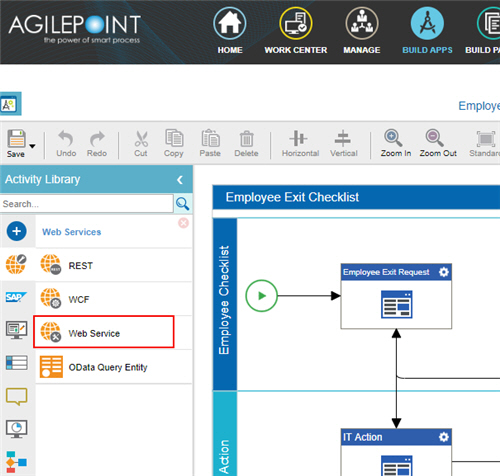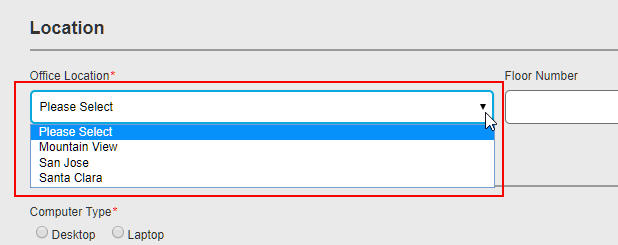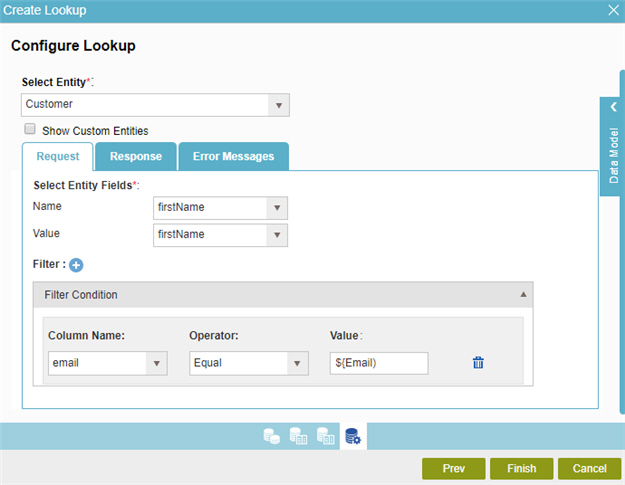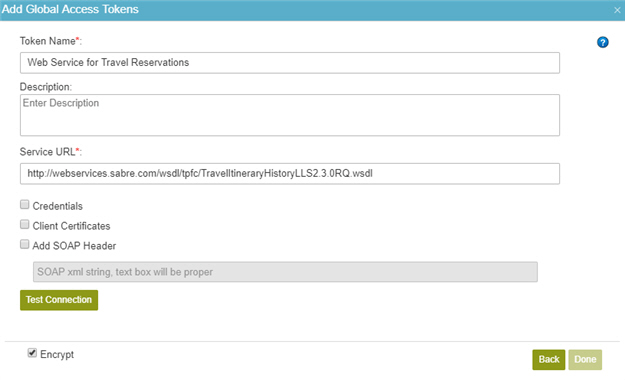web service
Web service is a programming standard that lets services communicate over HTTP using standard formats, such as XML and JSON.
Integrations and Connectors
AgilePoint NX integrates in these ways with web services:
- Activities in Process Builder
- Lookups in eForm Builder
- Access tokens
- Web services API
Activities in Process Builder
You can use out-of-the-box activities for web service to execute actions in process-based apps.
An activity is a functional unit, or task, in a process-based app. Activities that integrate with a third-party system provide access to the API functionality for that system in a simple, point-and-click, form-entry format. This means that you can easily leverage APIs without writing code.

The following activities are available.
- Web Service
For more information, refer to Web Service activity in Process Builder:
Lookups in eForm Builder
You can create lookups for web service in eForm Builder and form-based apps.
A lookup is an automated procedure that retrieves data from an external data source, such as a database or third-party service, to display runtime. For example, you can use a lookup to populate the options in a list on an eForm.
For more information, refer to Web Service lookup configuration screens.


This image is only one example configuration screen from the Auto-Lookup form control. It does not show all the configuration options, and lookups can be configured and executed in multiple ways. The Auto-Lookup control can perform a lookup for eForms or other controls. However, many other form controls have built-in lookup capabilities — for example, the Drop-Down List form control. For information about how to configure lookups, refer to eForm Controls.
Access Tokens
You can create access tokens for web service.
An access token is a secure object that stores an endpoint (usually a URL) and authentication credentials to connect to a service or technology. Often this is an external or third-party service, like Salesforce or SharePoint, but access tokens can also connect to an AgilePoint NX enviornment, local database, or other types of technologies. Once an access token is created, application designers can simply select and reuse it, rather than entering the credentials each time they are needed.
For more information, refer to Access tokens for Web Service.

Web Services API
You can access the AgilePoint remote API using a web service or a Windows service (WCF).
For more information, refer to Web Services API.
Related Topics
Examples
Some information about third-party integrations is outside the scope of the AgilePoint NX Product Documentation, and it is the responsibility of the vendors who create and maintain these technologies to provide this information. This includes specific business uses cases and examples; explanations for third-party concepts; details about the data models and input and output data formats for third-party technologies; and various types of IDs, URL patterns, connection string formats, and other technical information that is specific to the third-party technologies. For more information, refer to Where Can I Find Information and Examples for Third-Party Integrations?
Video: Show Data from a Web Service on an eForm
Video: Configure a Web Service Activity
About This Page
This page is a navigational feature that can help you find the most important information about this topic from one location. It centralizes access to information about the concept that may be found in different parts of the documentation, provides any videos that may be available for this topic, and facilitates search using synonyms or related terms. Use the links on this page to find the information that is the most relevant to your needs.
Keywords
web service, web services, web service method, web method


